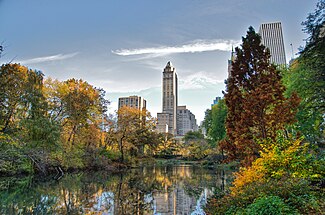Central Park (New York)
| Central Park | |
|---|---|

The Pond and Hallett Nature Sanctuary in the park's southeast corner
|
|
|
Location
|
|
| Type | Urban park |
| Location | Manhattan, New York City |
| Coordinates | 40°46′56″N 73°57′55″W / 40.78222°N 73.96528°WCoordinates: 40°46′56″N 73°57′55″W / 40.78222°N 73.96528°W |
| Area | 843 acres (3.41 km2) |
| Created | 1857 |
| Owned by | New York City Department of Parks and Recreation |
| Operated by | Central Park Conservancy |
| Visitors | about 37.5 million annually |
| Status | Open all year |
| Architect | Frederick Law Olmsted (1822–1903), Calvert Vaux (1824–1895) |
| NRHP Reference # | 66000538 |
| Significant dates | |
| Added to NRHP | October 15, 1966 |
| Designated NHL | May 23, 1963 |
Central Park is an urban park in Manhattan, New York City. Central Park is the most visited urban park in the United States, with 40 million visitors in 2013, and one of the most filmed locations in the world.
The park was established in 1857 on 778 acres (315 ha) of city-owned land. In 1858, Frederick Law Olmsted and Calvert Vaux, a landscape architect and an architect, respectively, won a design competition to improve and expand the park with a plan they titled the "Greensward Plan". Construction began the same year and the park's first area was opened to the public in the winter of 1858. Construction continued during the American Civil War farther north, and was expanded to its current size of 843 acres (341 ha) in 1873.
Central Park was designated a National Historic Landmark by the U.S. Department of the Interior in 1962. The Park, managed for decades by the New York City Department of Parks and Recreation, is currently managed by the Central Park Conservancy under contract with the municipal government in a public-private partnership. The Conservancy is a non-profit organization that contributes 75 percent of Central Park's $65 million annual budget and is responsible for all basic care of the 843-acre park.
Between 1821 and 1855, New York City nearly quadrupled in population. As the city expanded northward up Manhattan, people were drawn to the few existing open spaces, mainly cemeteries, to get away from the noise and chaotic life in the city. Since Central Park was not part of the original Commissioners' Plan of 1811, John Randel, Jr., surveyed the grounds. The only remaining surveying bolt from his survey is still visible; it is embedded in a rock just north of the present Dairy and the 65th Street Transverse, and south of Center Drive. The bolt marks the location where West 65th Street would have intersected Sixth Avenue.
...
Wikipedia




